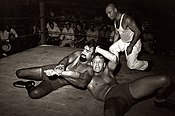| Part of a series on |
| Professional wrestling |
|---|
 |
The history of professional wrestling in the United Kingdom spans over one hundred years. After a brief spell of popularity for Greco Roman professional wrestling during the Edwardian era, the first catch-as-catch-can based scene began in the 1930s,[1] when it was popularised under the concept of "All-in Wrestling", which emphasised an "anything goes" style and presentation. Following World War II, the style and presentation of professional wrestling in the UK underwent a dramatic shift, as the Admiral-Lord Mountevans rules were introduced to make British professional wrestling appear much closer to a legitimate sport. Professional wrestling entered the mainstream British culture when the newly-formed independent television network ITV began broadcasting it in 1955, firstly on Saturday afternoons and then also in a late-night midweek slot. Domestically produced professional wrestling was at its peak of popularity when the television show World of Sport was launched in the mid-1960s, making household names out of Adrian Street, Mick McManus, Giant Haystacks, Jackie Pallo, Big Daddy, Mark Rocco, Steve Veidor, Dynamite Kid, and Kendo Nagasaki.[2]
An upmarket rebrand of ITV's sports coverage,[3] alongside the entry of the American World Wrestling Federation into the market in the late 1980s, contributed to a decline in support for domestic British wrestling and stars.[2][4][5][3][6] In 1985, World of Sport ended,[7][8] and a subsequent stand-alone wrestling programme lasted until the end of 1988. Without mainstream television access, domestically produced professional wrestling would struggle in the United Kingdom.[2][4][5][3] Nonetheless, the largely untelevised live circuit survived and at times thrived with some promotions featuring the traditional British style of wrestling,[9][10] while others adopted the contemporary American independent style.
In the 21st century, mirroring the growing strength of the Independent circuit in the United States, support for domestic professional wrestling once again began to grow, leading to the rise of several prominent and stable independent wrestling promotions throughout the United Kingdom. This, combined with strategic partnerships with Japanese professional wrestling promotions, allowed for a new generation of professional wrestlers such as Will Ospreay, Zack Sabre Jr. and Pete Dunne to rise to prominence internationally.
- ^ "All In was introduced to Britain in 1930 by Atholl Oakeley, a professional wrestler turned promoter" The Wrestling, Simon Garfield, Faber & Faber 1996 edition page 16
- ^ a b c Hodgson, Richard. "Legends of British Wrestling". BBC. Retrieved 28 January 2024.
During the decline suffered by British wrestling in the late 1980s
- ^ a b c Litherland, Benjamin (2012). "Selling punches: free markets and professional wrestling in the UK, 1986-1993". Journal of Historical Research in Marketing. 4 (4): 578–598. doi:10.1108/17557501211281914. Retrieved 28 January 2024.
- ^ a b "An overview of the history of British wrestling scene". Pro Wrestling Torch. 11 September 2017.
Sadly, though, wrestling started to become less popular and viewing numbers dwindled as the more glitzy hollywood style became the forefront of the sport, gaining hugely in notoriety across the pond. British wrestling faced a quiet exodus and a once-glorious and thriving business became almost obsolete. World Of Sport would shut its doors in 1988 and wrestling disappeared from British terrestrial television.
- ^ a b Craig, Bradley (7 October 2018). "Making a case for Jackie Pallo to be a WO Hall of Famer". Wrestling Observer Newsletter. Retrieved 28 January 2024.
Meanwhile, the domestic industry of wrestling continued to decline. Failing to modernise with the changing tastes of its audience, the Saturday afternoon institution ended up getting cancelled by ITV in 1988.
- ^ Spark, Alasdair (Spring 1996). "Wrestling with America: Media, National Images, and the Global Village". The Journal of Popular Culture. 29 (4): 83–98. doi:10.1111/j.0022-3840.1996.83984987.x. Retrieved 28 January 2024.
- ^ "WORLD OF SPORT Notes Series broadcast on Saturday by ITV, featuring matches, sport reports, results and scores. GB. ITV Sport production, Tx LWT: 1965/01/02 - 1985/09/28" British Film Archive online catalogue, retrieved 28 January 2024
- ^ Slam Wrestling revewi of "Have A Good Week" by John Lister, Bradley Craig, Oct 4, 2021 retried January 28 2024
- ^ Fighting Spirit Magazine issue 109 June 2014 Brian Dixon interview by John Lister
- ^ Cite error: The named reference
freemantlewas invoked but never defined (see the help page).